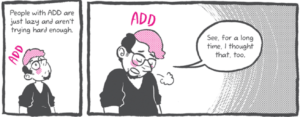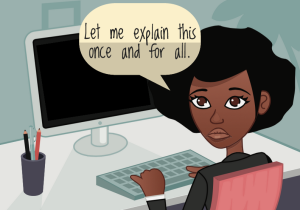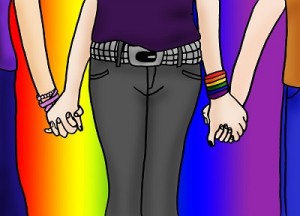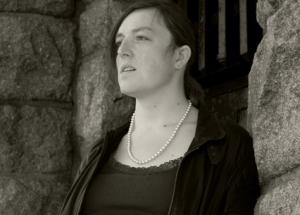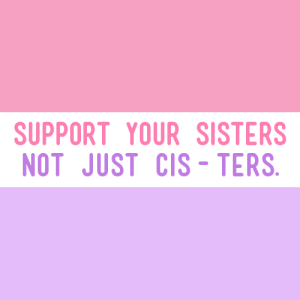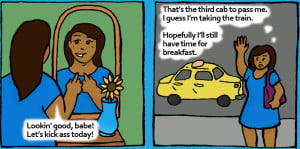Originally published on Thinking Race and republished here with permission.
Working in student affairs on a university campus, I feel like I hear the words “intersectionality” or “intersectional” said out loud at least twenty times a day (no exaggeration).
The word is regularly used as a powerful critique from young women of color about how white feminist staff members don’t seem to understand the violence we enact. Often, though, I hear the term used by white feminists or “social justice-focused” staff such as myself.
We use the term in many vague ways: “We really need to be sure our work is intersectional. We need to be more intersectional in how we talk about student identities. Our teaching strategies must be intersectional and culturally responsive.”
I don’t use “we” in the royal sense. This is something I do all the time without thinking critically about my meaning.
But what the hell are we even saying when we use the term?
We have students fill out “identity wheels” but don’t interrogate how those multiple forms of identity compound in our own complicity in the oppression of students. We treat intersectionality as if it’s simply a way to understand our differences.
Intersectionality as a Theory of Oppression
It is indeed true that the term’s originator, Dr. Kimberlé Crenshaw, called for us to “account for multiple grounds of identity when considering how the social world is constructed” (p. 1245). In this way, Crenshaw’s concept echoes Audre Lorde:
We need to be clear, though, that Crenshaw didn’t take up critique of the ways that discrimination law erases Black women by framing “subordination as disadvantage occurring along a single categorical axis” (p. 140) to paint a cute, liberal portrait of the unique experiences of Black women.
She was making a pointed argument about how the very law that feigned protection for Black women was further marginalizing them by refusing to consider their oppression at the intersections of identity.
In short, intersectionality isn’t a theory of difference. It’s a theory of oppression. And when we treat it simply as a way to understand our differences, we erase its powerfully subversive critique.
Thus, we need to recognize that it’s an act of intellectual, discursive, and rhetorical colonization for white folks (and folks with other forms of privilege) to erase the critique of power from our use of intersectionality.
Unlike colonization of land and bodies, this discursive colonization is harder to interrupt because it’s harder to see, but this doesn’t mean that the colonization of inersectionality is somehow not violent. As Zeus Leonardo and Ronald Porter point out:
It may be a euphemized form of violence, a discursive ‘cool violence’ compared to the ‘hot violence’ of economic exploitation…but linguistic racism is no less a violation…maintains links between material distributions of power and a politics of recognition…and lowers standards of humanity. It reaffirms Zizek’s (2008) insight that violence is part of the fabric of the daily functioning of social life where systemic and symbolic violence passes as natural (p.140).
Of course, it’s seductive for those with access to power and privilege to (intentionally or unintentionally) treat intersectionality as a frame for understanding how our identities are complex.
But it’s because of the fact that understanding intersectionality as a frame for difference erases the power I hold as a white, cisgender man and the ways I’m complicit in oppression that such erasure is an act of colonization.
Racial Liberalism and Co-optation Isn’t Exactly New
What’s driving the colonization of intersectionality? Said simply, the problem is liberalism.
No, not that liberalism, not the “R vs. D, the democrats are liberals” type of liberalism. We’re not talking about partisan politics.
We’re talking racial liberalism in the sense put forth by Charles Mills and Kimberlé Crenshaw.
Liberalism reflects a way of thinking about injustice and inequity in society. Liberalism, as an ideology, emphasizes reform – relatively small tweaks to fundamentally unjust systems – that preserve the overarching structure and as a result poses little threat to the racial contract.
Whereas intersectionality (as a tenet of Critical Race Theory) challenges the very foundations and structures of our society, demanding profound transformation, liberalism (by intent or impact) preserves whiteness as property and the white supremacist, capitalist hetero-patriarchy (to borrow from bell hooks).
Crenshaw makes an important distinction between expansive and restrictive views of equality, noting that critical activists, educators, and theorists seek transformation that impacts the lived realities – the actual outcomes – of people of color and other oppressed groups.
Liberal reform, though, serves a “restrictive view” of equality, which treats equality as a process, downplaying the significance of actual outcomes.
The primary objective of antidiscrimination law, according to this vision, is to prevent future wrongdoing rather than to redress present manifestations of past injustice. ‘Wrongdoing,’ moreover, is seen primarily as isolated actions against individuals rather than as a societal policy against an entire group” (p. 1342).
For example, the overwhelming and oft-unexamined whiteness of teaching lends itself to a liberal view of equality in schools, and as such, there is a long history of liberal cooptation of racial justice projects in ways that serve the status quo and offer little hope of transformative change.
The “multiculturalism” movement in education originally started as one calling for radical restructuring of curriculum and pedagogies to meet the needs of students of color who are owed an education debt.
Such a radical restructuring would demand a great deal of white teachers, particularly as it relates to divestment from whiteness, and as such, those committed to whiteness have managed to co-opt the concept into a liberal, feel-good approach to education that highlights “food, festival, folklore, and fashion.”
Similar to what’s happening with the colonization of intersectionality, multicultural education was divorced from its critique of white supremacy.
Though I’ve been describing the colonization of intersectionality in some really abstract, theoretical ways, it’s actually playing out in specific manifestations that demand interruption.
Here are but three of approximately one million ways white folks are colonizing intersectionality that can help to ground the abstraction.
1. Columbusing Intersectionality While Teaching It as a Theory of Difference
Columbusing refers to the all-too-common act of white people taking something that was originated by people of color, divorcing it from its roots, and re-appropriating it in some way that serves white interests.
Ironically, I couldn’t actually trace the term Columbusing back to its originator (though it seems fitting to perhaps credit Urban Dictionary contributor Harunei).
In the case of intersectionality, it’s rare that I meet white folks who are able to identify the term’s originator, and as a result, we often distort the term’s meaning, thus robbing it of its power.
More often than not, I hear us use intersectionality as a stand-in for “difference,” as in “we need to recognize the intersectionality in this issue = we need to recognize that identity makes for differential experiences.” I’ve even done it myself.
In a keynote slide presentation I wrote in 2013, I included a photo of Kimberlé Crenshaw with the following text:
Intersectionality. Introduced by Legal Scholar Kimberlé Crenshaw, intersectionality is a framework for understanding the ways that multiple aspects of our identities intersect, influence one another, and compound to create unique experiences. The concept is regularly used to describe the ways that societal privilege and oppression is complicated by the different parts of our identity that are marginalized or privileged in society.
First off, by simply calling Crenshaw a “legal scholar,” I ignore her profound contributions to feminist and Critical Race legal theory. Second, while I did name oppression, the primary explanation of intersectionality in my slide focuses on how identities “compound to create new experiences.”
My point here is to highlight just how common and insidious the Columbusing can be. In my slide, I did give credit to Crenshaw, but I twisted the meaning of her term in a way that serves white liberalism.
2. Highlighting One’s Marginalizations to Avoid Accountability
Another common act that contributes to the colonization of intersectionality is using the term to avoid accountability for one’s privilege.
I’ve seen it used countless times to avoid accountability for being called out on all sorts of unchecked privilege, though most often I’ve seen it from fellow white folks.
There’s the appeal to another aspect of marginalization with a surface-level appeal to intersectionality to shift the focus of critique away from oneself.
With white men, the appeal usually is to one’s class/wealth status to avoid being held accountable for one’s privilege, or among white queer men, we default to identifications of our queerness and intersectionality.
But with white women, it can get a little more complicated.
A common way this happens is when white women are reminded of how their tears can function in spaces of interracial dialogue or conflict as a tool of oppression of women of color, as it can lead to the centering of the white woman’s feelings and a shifting away from the critique that was offered which led to the tears.
Many times, I’ve seen this shift done while directly citing how we need to be “intersectional” in how we offer critiques.
When a surface-level understanding of interesectionality is used as a cudgel against those offering us criticism of how we wield our societal power, we have completely bastardized the concept.
No part of intersectionality as a theoretical frame demands that those who are oppressed temper their criticisms of those with power in order to avoid offending those with power because they also hold marginalized identities.
3. Calling for Intersectionality Without Doing the Work to Disrupt White Supremacy
Perhaps the most common and pervasive way that white folks are colonizing intersectionality is through the near-constant use of the term in white leftist circles without any clear intention to work to dismantle White supremacy.
Phrases like “we really need to be more intersectional” or “intersectionality matters” or “let’s make sure to bring in an intersectional analysis here” could not be more common.
Yet when we are pressed to do work that might actually decenter whiteness or challenge systemic white supremacy in our spaces, we don’t show up.
A perfect example is at my university where students with multiple marginalized identities came together to offer a list of demands from the institution.
More than a year later, relatively few of the demands have been met, and the very same administrators and university personnel who use the language of interesectionality constantly have stood in the way of possible changes because they were “unrealistic” or would (for example) damage the university’s relationship with Border Patrol (a fundamentally oppressive and violent institution).
The Will to Realize Change
White folks in social justice circles have a responsibility to interrupt the active colonization of intersectionality.
We have to demonstrate a will to change our own investments in realizing racial justice, part of which means pushing past platitudes and surface-level rhetoric to actually strive for more accountable commitments to people of color in working for justice.
We must stop using the term unless we’re being faithful to the originator’s critique of power and oppression, particularly centering and emphasizing race as a central operating principle in the oppressive project that is Western capitalism.
If we’re using intersectionality as a frame for understanding the difference rather than for understanding power, we’re participating in the colonization of the term.
We need to stop erasing Black women (most notably Kimberlé Crenshaw) in how we talk about intersectionality.
And we must work for more nuanced incorporation of intersectionality, not just as a term, but as a way for understanding oppression and for working to dismantle oppressive systems in which we are often most complicit.
While there’s no simple playbook for taking up truly intersectional praxis, there’s one obvious place we can start: listen to and follow the leadership of people of color, most often women and queer folks of color, who are living intersectional resistance and calling for accountability from those of us who are complicit in colonizing intersectionality.
[do_widget id=’text-101′]
Jamie Utt is a doctoral student in Teaching, Learning, and Sociocultural Studies at the University of Arizona where he studies the intersections of race and schooling. His research focuses on the role of White teachers’ racial identity on their teaching practice and on the racialized role of police in schools. Since 2004, Jamie has worked as a consultant, educator, and trainer across the United States to build safer, more inclusive, and more justice-centered communities. He often works with K-12 schools doing equity consulting and works with colleges and universities on issues of sexual violence prevention. In his time at the University of Arizona, he has co-created ASAP: Advocating Sexual Assault Prevention, a four-tier program for prevention of sexual violence in institutions of higher education. Jamie is also the Founder and Director of Education at CivilSchools where he designed a comprehensive, research-based program for actually preventing and responding to bullying behavior in 6-12 schools. CivilSchools is currently being implemented in schools all around the United States to empower every member of school communities with the tools necessary to build positive school culture where bullying no longer takes place.
Search our 3000+ articles!
Read our articles about:
Our online racial justice training
Used by hundreds of universities, non-profits, and businesses.
Click to learn more






